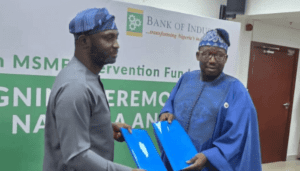

Banks’ lending rate hits 29.94%, highest since 2020
Following the Central Bank of Nigeria’s (CBN) consistent hike of its Monetary Policy Rate (MPR), the banking sector’s maximum lending rate increased to 29.49 per cent in April, rising from 29.38 per cent in March 2024, the highest since 2020.
When the average maximum lending rate was 29.38 per cent, credit to the real sector dropped, resulting in weak business activities.
Maximum lending rate refers to the rate at which commercial banks lend to customers with low credit ratings.
Data sourced from the apex bank’s money market indicator revealed that the average maximum lending rate opened in January 2024 at 27.07 per cent when MPR was at 18.75 per cent, and dropped to 26.55 per cent in February 2024, when the monetary policy committee of CBN hiked MPR to 22.75 per cent.
In March and April 2024, the banking sector’s average maximum lending rate stood at 29.38 per cent and 29.49 per cent respectively, amid 24.75 per cent MPR.
In 2020, the average maximum lending rate reached a peak of 30.73 per cent when the MPR rate stood at 13.5 per cent
Looking at the trend, analysts have predicted a further increase in the maximum lending rate would increase further owing to the hike to 26.25 per cent by the Monetary Policy Committee (MPC) of the CBN at the May 2024 meeting.
The average maximum lending rate closed in at 26.62 per cent in 2023 on the backdrop of the CBN hike in MPR to 18.75 per cent.
The unexpected rise in MPR, which the CBN attributes to efforts to curb inflation and the pressure on foreign exchange, has impacted the banking sector’s lending rates.
Hard as the decision is on the Nigerian business community, it has garnered praise from the International Monetary Fund (IMF) which commended the MPC’s resolve to tighten monetary policy further by increasing the policy rate to 26.25 per cent.
Such is seen as a strategic manoeuvre to curb the inflation surge, which recorded a year-on-year peak of 33.69 per cent in April 2024, and to mitigate the depreciative pressures on the naira.
However, the steep increase has sparked concerns regarding the impact on the cost of credit for businesses already facing economic hardships.
Each bank offers different lending rates that reflect their respective approaches to lending to the manufacturing sector in Nigeria.
In Nigeria, large corporations perceived as having lesser risk with a history of generating consistent cash flows are offered prime lending rates, while small businesses and individuals perceived as having higher risk typically fall above the prime lending rate margin.
“The rate hike will slow economic growth and reduce consumer spending”, says analysts at FBN Quest who are observing the trend.
“Ultimately, the impact on the general economy could be a potential slowdown in economic growth, with consumer spending suppressed, and a decrease in business investments,” FBN Quest said in a recent note.
The chief executive of the Centre for Promotion of Private Enterprise (CPPE), Muda Yusuf shared similar concerns that the hike in MPR would mean a higher cost of credit to the real sector.
“The new dramatic increase in MPR means that the cost of credit to the few private sectors that have exposure to bank credits will increase, which will impact their operating costs, prices of their products and profit margins, amidst very challenging operating conditions.”
In the Nigerian context, Yusuf said price levels are not interest-sensitive, stressing that supply-side issues are much more profound drivers of inflation, as the hike would further pose a risk to the financial intermediation role of financial institutions in the country.
“The increase would constrain the capacity of banks to support economic growth and investment, especially in the real sector of the economy because the increases are quite significant.
“Already, bank lending has been constrained by the high CRR, which is as high as 50 per cent in many banks. The Nigerian banks are yet to live up to their financial intermediation role because of these constraining factors,” he concluded.




